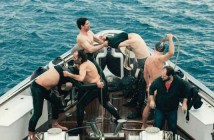
In her latest feature film, Rachel Athina Tsangari crafts a Godot-esque, minimalist world set almost entirely in a medium-sized yacht with six men on board – plus the boat captain and chef — on its way back to Athens after an escapade of fishing. For these men of leisure, leisure takes a strange, confrontational hue when they decide to play a game of ‘Who is the best in general?’ to while away the time before they reach port. Pushing the notion of game and play to its most plausibly illogical – and therefore human, all too human – limits, the result is a peeling away of social masks and masculine anxieties that manages to be both comical of and insightful about male bravado, self-preservation, and the perception of others. This play with play also lays bare the mechanistic drive that often sadly but also riotously underwrites human communication, namely, one-upmanship. Halfway through the film, one wonders how such a tale can sustain itself without risking repetition and falling into stagnation. For the most part, the film does avoid lapsing into navel-gazing boredom due to the increasingly farcical nature and emotional stakes in the game for the characters.
Tsangari and cast build the comedy and insight with petty details transformed into rather sober discourses of (masculine) being. As part of the game, each man is equipped with a small notebook and pencil as he measures the quality of his friends at the level of gesture, speech, marital and professional status, physical shape, and every other action that he engages in during the remaining days of the journey. The bittersweet truth of finding fault before goodness in others immediately rears its head through the game: in the way one sleeps, dresses, converses, withstands the cold, among other things. Like scientists posing as each other’s guinea pigs in a floating-on-water laboratory, scenes become punctuated with several of the men opening their notebooks and jotting down notes of the behaviour that they have just observed. In the process, the game acquires a seriousness among the men (and, inversely, an absurdity for the spectator) that befits scientists conducting experiments.
As the game progresses, the line between public and private spaces also disappears among the men and their modes of gauging each other. The men compete not only in their behaviour but also in concocting contests that further reveal increasingly private details at the level of the body: blood tests and, most notably, erections.
The blurring lines of public and private also find the film playing loosely with reality television tropes and the notion of surveillance. In one sense, the film could have completely taken the route of Real World-style tomfoolery as the men doggedly try to outdo one another in all aspects of what is often considered manly. Brief shots of each man in his own room facing a mirror (but not the camera) at various points in the film once the game has started can be read as a play on reality television’s confessionals – and alliances are struck between several of the men. While reality television does come to mind while watching the film, it does so as an unintentional satire of it. The men do not follow each other around the boat wielding a camera or their cellphone to document one another’s actions as evidential narration. In fact, the game remains just that; emotions boil over as a result of the constant surveillance of each other, but there is no room for histrionics like extended bouts of weeping revelations or dangerous self-loathing. Ultimately, that the men fail to realise entirely the ridiculousness of their enterprise while the film as omniscient narrator does locates the film less in reality television self-indulgence and more in Swiftian satire of human folly and fallibility. Like another, earlier film with a singular boat setting and the clashing of men’s egos (though fewer in number), Knife in the Water (1962), Chevalier depicts a gentleman’s game of pride and perception that, as it unfolds, becomes less and less gentlemanly.
In still another sense, the film also toys around with the notion of the Foucauldian panopticon, a mode of surveillance in which a prisoner generates his/her own subjection to power by virtue of knowing that s/he is being watched: ‘He who is subjected to a field of visibility, and who knows it, assumes responsibility for the constraints of power; he makes them play spontaneously upon himself; he inscribes in himself the power relation in which he simultaneously plays both roles; he becomes the principle of his own subjection’ (Foucault, Discipline and Punish, 202-203). What Foucault describes in his book about penal systems startlingly applies to what occurs in Chevalier and its cast of characters. Here, however, the eye of surveillance and discipline is not an invisible superior power but one’s peers.
Pursuing both the Foucauldian panopticon and scientist analogy further, Tsangari is the ultimate surveillance eye and scientist in the end, examining ever so carefully this species called humans; and, more specifically, the species’ male population. The opening scenes actually invite this take: the men emerge from the sea, lie on the gravelly shore to soak up the sun for a while, then on the boat they help each other divest themselves of their wetsuits, like creatures returning to their regular habitat after a period of hunting for food. It is an elegant species, as at the dinner table, where politeness mostly reigns and the men show their dexterity in using the fork and knife. Yet how easily and quickly,Tsangari and the film relate, the layers of propriety and graciousness can be removed in the face of scrutiny.
Like a dream, the game dissolves into the night air when the boat finally docks. And just as quickly and easily, the men return to their social masks, complete with their anxieties intact and unresolved; in short, they return to the more convoluted game of life.



